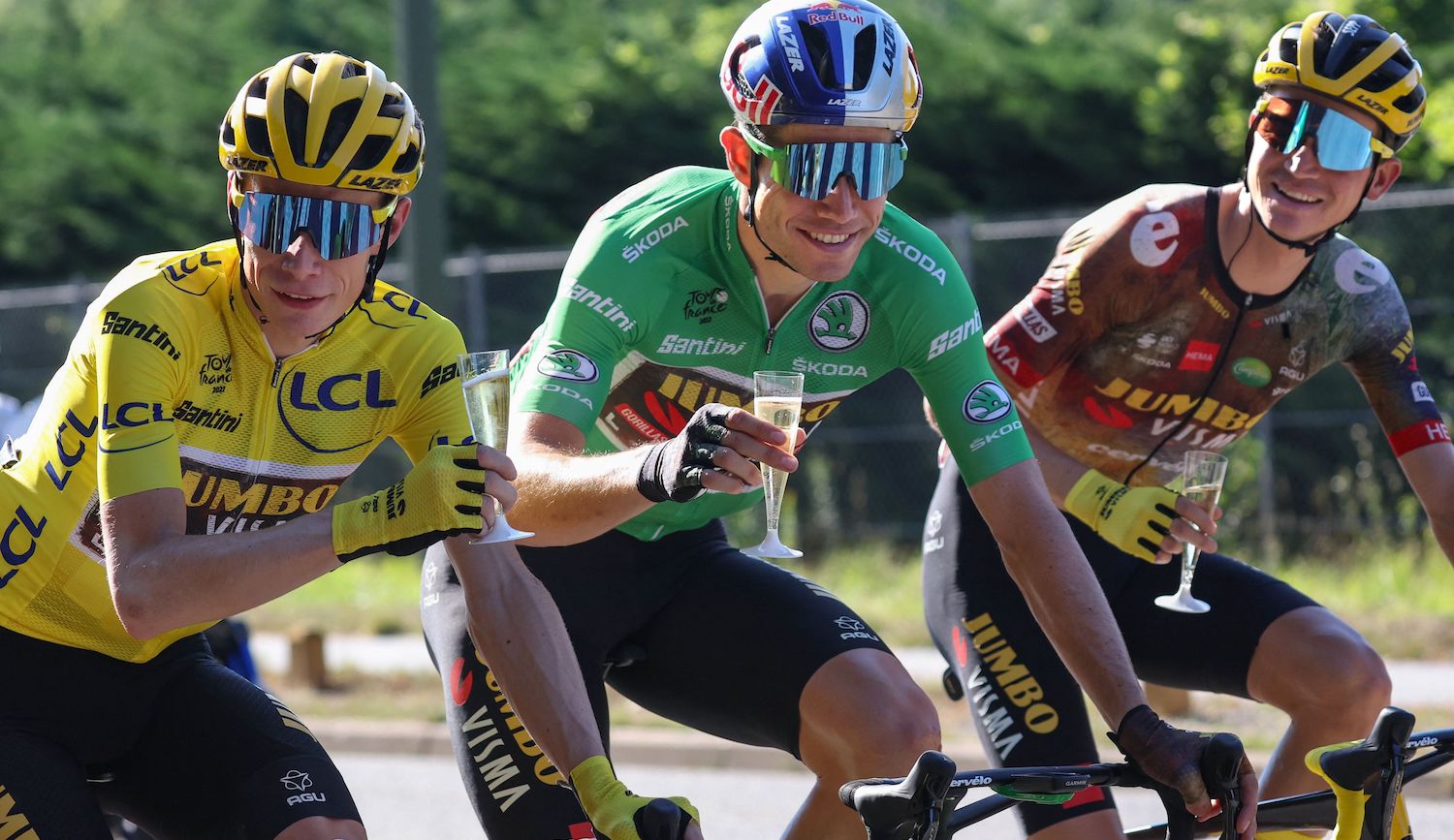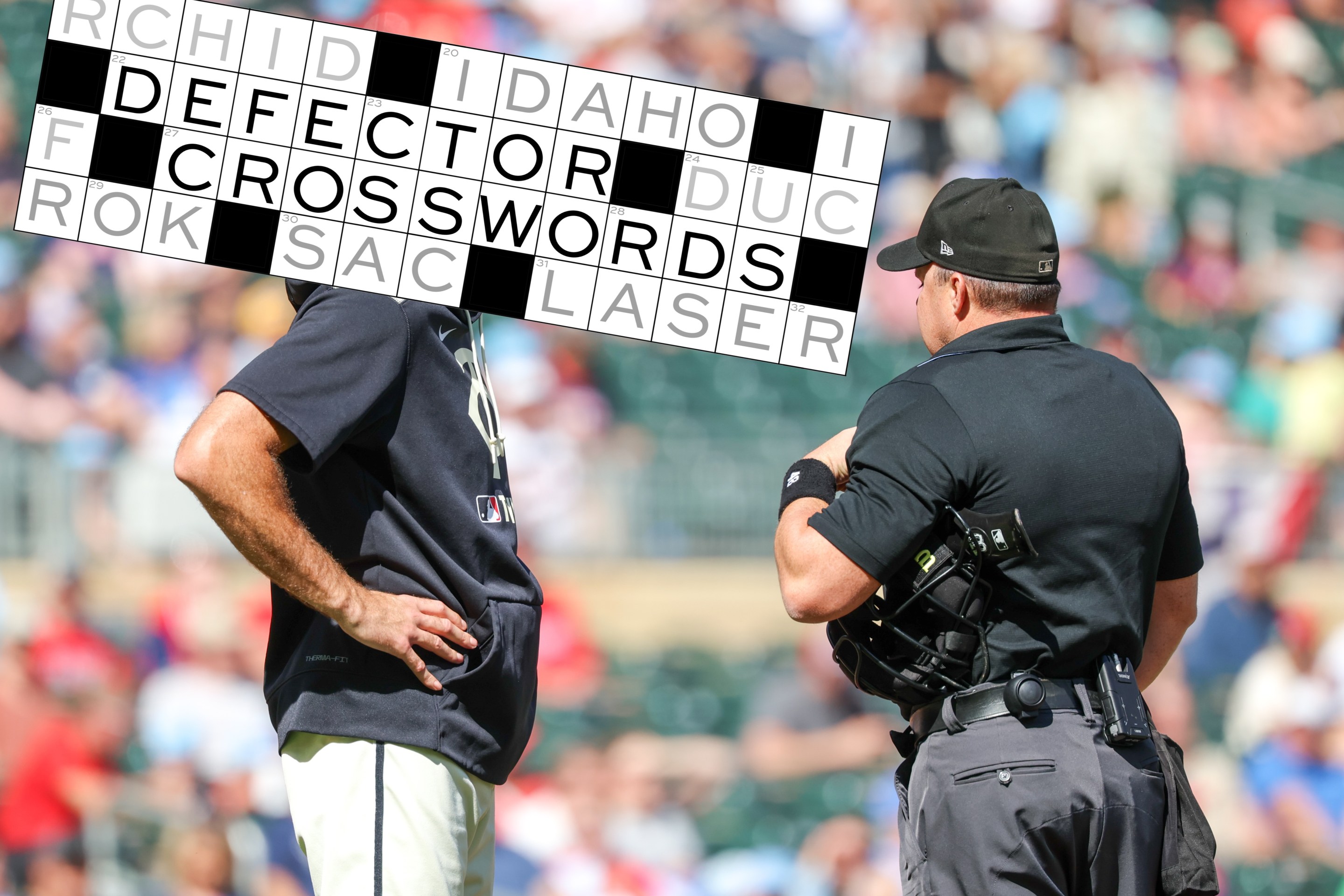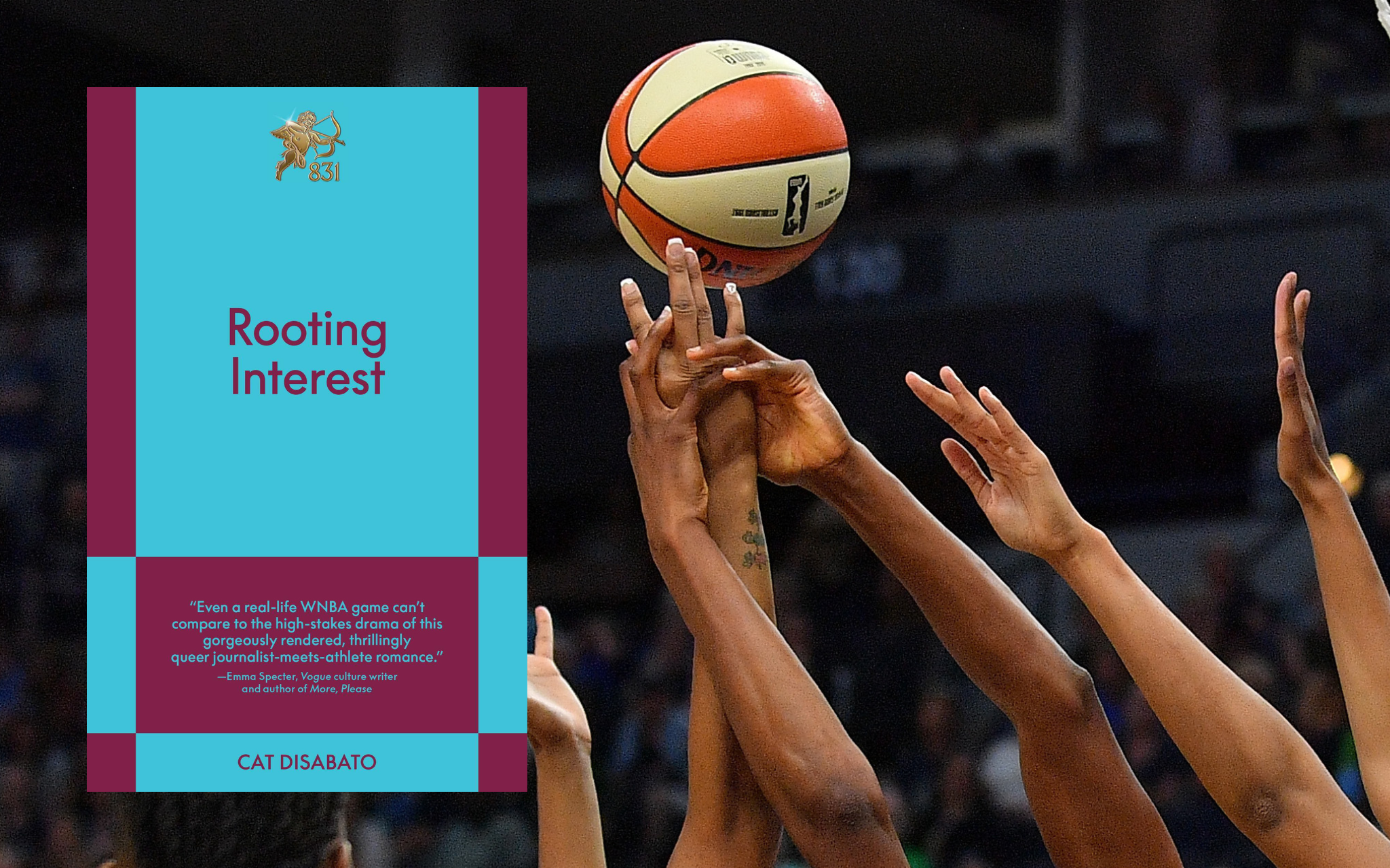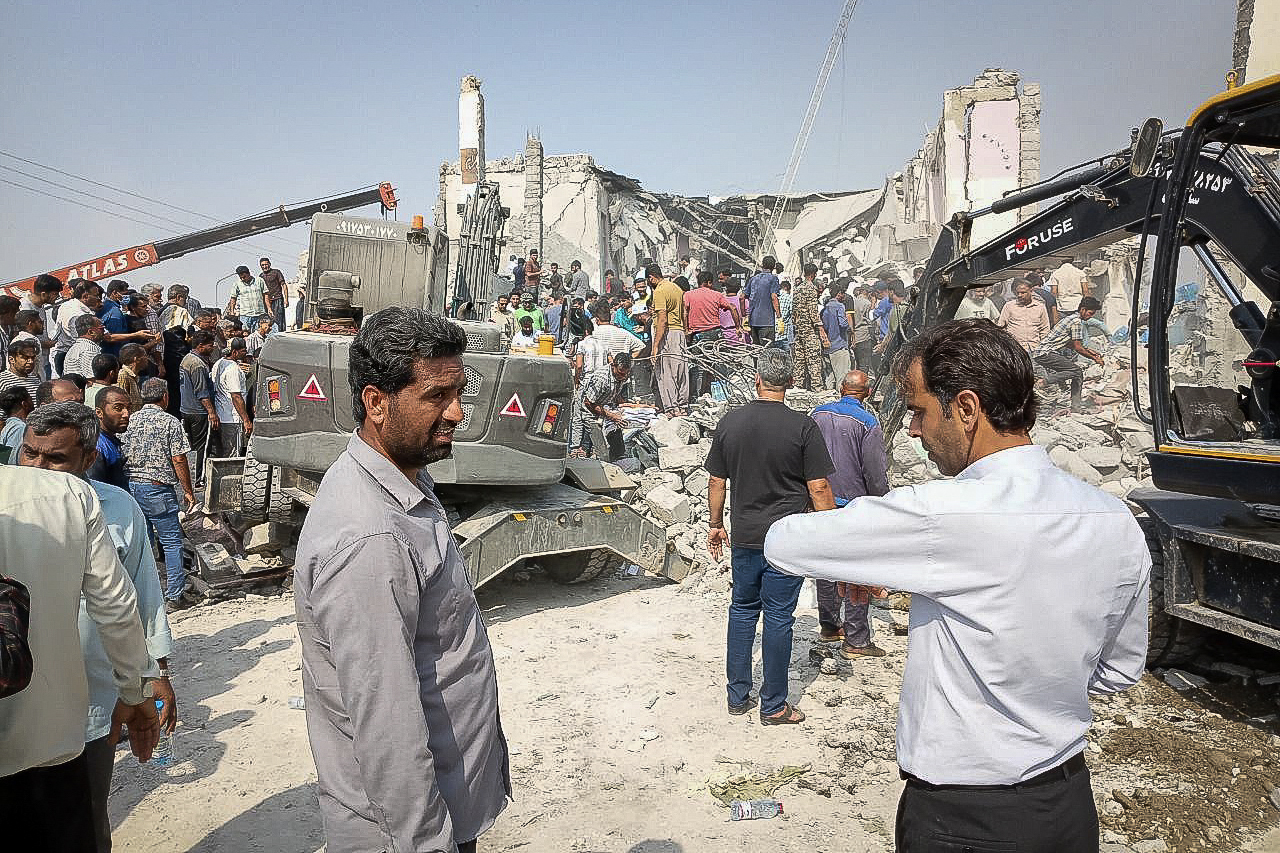The Drive To Survive-ification will continue until morale improves: Three weeks ago, Netflix released Tour de France: Unchained, their latest foray into fly-on-the-wall docuseries looks into big-time sporting events. It follows several riders and teams through the 2022 Tour, attempting to showcase the personalities and motivations behind all that on-bike drama. Like its predecessors, the docuseries tries to walk the line between giving cycling heads what they want and holding the hands of curious newcomers. It just so happens we have both kinds here, and as the 2023 Tour de France starts this weekend, three Defector staffers watched the eight-episode series ahead of the race and talked through their thoughts.
Patrick Redford: Bonjour! What level of familiarity, with both pro cycling in general and the 2022 Tour de France specifically, were you fellas bringing to Unchained: Drive To Survive But On Bikes? I’m assuming we have a pretty wide skew.
Dave McKenna: Bottom-level familiarity. I could name Eddy Merckz (sic) but probably couldn’t spell it right, plus Greg LeMond and Lance Armstrong as Tour winners, and when I was a kid my father bought a Peugeot that I can’t spell right either for the three of us (Ed. note: one-for-two!). That was exotic as hell. And I’ve been to France a bunch of times but still don’t know how to ask where the bathroom is. OK, I’m tapped. I have a bunch of bikes I got during the pandemic and rode tons. But anything I know about competitive cycling was from following the Lance story obsessively or reading your pieces. I was clay in the filmmakers’ hands.
Giri Nathan: I haven’t watched much live cycling, so mostly osmosis through your bike blogs—except for the one where you blogged every cyclist in the Tour de France (you pervert), which washed over me. I must admit it wasn’t always easy to keep track of the deep field of cyclists, and in particular, the vowel-ridden Belgian names. Pumped to see Wout van Aert in the series, a guy I recognized, though I did have to copy and paste that in right now to be safe. He wound up being my favorite personality to follow. I was just in Spain and France and I saw them hyping up the Tour, so that whetted my appetite for this series. I was also dimly aware that riders specialized in particular terrain, and that there was an element of team strategy, both of which ended up being interesting themes of the show. I knew about yellow jerseys, but not green jerseys. I did not remember the term “domestiques.”
PR: The Wout stuff is a good way in here. It turned out to be fortuitous that Jumbo was one of the teams that gave them access, since he and Jonas Vingegaard were two of the main protagonists of the Tour, but more so because the primp on his little swoop hairdo for the talking-to-camera bits was really something. He took issue with the light villain arc they saddled him with, which I also found baffling. He did the work of like two or three domestiques throughout the Tour for Vingegaard, and the episode where they made the case that he personally fucked up by getting dropped on a big huge climb was bizarre. That’s not his job!
My theory here is that cycling is a very buttoned-up sport, one that lacks the inherent flair and drama of F1, and the producers needed to hang a narrative arc around something.
DM: I didn’t like the way Wout got treated either. And I still don’t know what a green jersey means. Shoulda spent less time demonizing poor Wout and more time telling dumbasses what a green jersey is. They tore him down to build him up, which woulda been more OK in a scripted work.
GN: Anytime there’s a chance to show competing incentives within a team I think the filmmakers really lock in on that—the F1 people did the same thing. I get it. There’s not really a clean analogue in American team sports or individual sports, and there’s some built-in drama to play with. I ended up rooting for Wout, and as his dominance became clearer throughout the show I wondered why he wasn’t a contender for GC, which Wout himself explains to the camera—it has to do with his body type, correct?
DM: Look at Giri dropping “GC” like a boss. Took me like five episodes to crack that code.
GN: I’m basically Patrick’s domestique now.
PR: Yeah, he's too bulky. Anyone who wants to win the whole thing must necessarily be waifish. I was pleasantly surprised by how well the show balanced the GC fight with all the other scuffles going in within the peloton. The best part of a Tour de France is that every rider has their own aims and there are way more things to fight before besides the yellow jersey. Clearly the best filmmaking-as-filmmaking bit was the end of the final episode, where they went tracking-camera mode on the Champs-Elysees, but also spent a long time showing how agonizingly difficult it is to fight for position within the front of the pack on a sprint stage.
DM: That shot was unreal. I was in awe the whole scene. Reminded me of how I felt when the Olympics track and field coverage got vehicles on wheels to keep up with Usain Bolt and the sprinters. Covering climbs is hard as hell, because they’re shooting these world-class athletes on bikes and in the hills these fat, drunk dudes in the crowd could jog and catch up with the competitors to cheer ‘em on. Made me laugh every time.
GN: What really came through for me was the absolute brutality of cycling. Obviously on some level I know every ultra-endurance sport is brutal, but seeing these guys dislocate shoulders in crashes, or get coated in soot after the cobbles, or dive-bomb each other in sprints all hit home that it’s warfare. Given how dangerous the sport itself is, I despised the intrusive fans. The guy who whacked Thibaut Pinot in the head should get whacked back at the same relative speed.
PR: I’m glad that inescapable difficulty came across, and as this project is replicating the Drive To Survive model, I kept wondering what their core pitch for the sport of cycling would be. In DtS, it’s hyper-competitiveness, but in Unchained, the sell is how difficult and dangerous this sport can be. Which I think gets to the relative lack of big-time drama: simply getting to Paris is so hard and racing any one of these stages so demanding that there’s a higher baseline of mutual respect between riders, and also, everyone is mostly fighting themselves, pushing their own limits.
DM: The emphasis on crashes shocked me. They began with a recounting of the Wolf Pack’s big crashes. Then I counted five crashes in the first 25 minutes of the first episode. It seemed to me they were sucking in the newbie viewer the way producers used to do with NASCAR, just load up on crashes. And, man, they were horrific. And the crashes kept on coming! It got sorta comical by the time they showed Geraint Thomas’s wife talking about watching her husband ride off a cliff. And then they showed him riding off a cliff! I really did not ever think about the role of crashes in the Tour de France or cycling before. I was halfway through watching the series when I read Patrick’s story about Gino Mäder’s death in a crash in the Tour de Suisse. Now I’d believe it if you told me it’s a dang demolition derby out there!
GN: Here’s a question for Patrick: Did you feel that the drama of the sport was accurately conveyed or misrepresented in some way? I thought the tennis version of this flubbed that challenge. Tension builds in tennis in a way that can’t really be captured by quick-cut montages, so I was disappointed by how they used all that sumptuous footage. I found myself craving slightly longer passages of play, so a new fan could feel the actual texture of the sport, like the panic or calm between points. Because cycling action plays out over even longer timeframes—unfeasibly long timeframes for this medium—I wonder if the snappy docuseries treatment could be even more frustrating for a real fan.
PR: A few moments of overdramatization made me roll my eyes—David Gaudu was never, ever going to catch Geraint Thomas for third and they made that seem like a real possibility—though all in all I actually thought they depicted it pretty well. Time trials are notoriously bad TV, though when they showed the penultimate stage of the Tour in Unchained through Wout's eyes, I was riveted. The little, constant montages of jam-packed intra-peloton group riding provided a nice baseline to show how nervous everyone is all the time, though one thing that is fun about watching the actual Tour de France is that everyone is this nervous for five hours, and all the drama plays out in a much more drawn out way. It’s fantastic TV, because you get to watch all the climbers squirm and writhe before they’re truly called upon. The point of the sport is pain, and I’m glad that’s where they centered their focus.
The Pogačar-Vingegaard scrap on the Col du Granon was one of the most dramatic duels of the past decade of racing, and the show was as locked in on it as it should have been. The only real weakness was its lack of access to Pogačar, who honestly is undersold as a terrifying rider to race against. He loves to inflict pain on everyone, at a level no other climber has in a while. I was treating the documentary as a highlight reel, and it succeeded there, though the real meat of cycling is the longer timescale stuff. They told but didn’t show, which makes sense given the form. I suppose the goal was to whet the appetites of non-watchers like you two with a little amuse bouche before the entree. How well did it work?
DM: That Gaudu/Thomas competition for a spot on the podium rang phony even to my newbie ass. Patrick, I fell for all the cyclists they introduced. Sweet Ben O’Connor from Australia, and clearly an Irish guy, was my favorite. I wish Ben and the others had made other choices in life, because they all seemed miserable as hell at all times. Every one of the main characters had a breakdown or more on camera, and none of the breakdowns were for joy. There’s no room for joy in cycling! All the talk was about pain and suffering and sadism and masochism, backed by endless shots of pain and suffering and sadism and masochism!
PR: Yeah, Australian rider Ben O’Connor, who is from Australia, will be back, and he’s been racing pretty well this summer, so I expect him to fight for a podium spot this year.
GN: I was in awe of how much these demons love pain. Other sports have stuff leavening the pain—timeouts, back-slapping camaraderie, celebrations of ingenuity—but this feels like pure pain, every day, for weeks. I will watch them swim in the pain over the next few weeks. The backdrop of pain made Pogačar's apparent levity really bone-chilling. I knew how good he was, from your coverage, but to see it in the flesh…
PR: Pog is a true-blue freak who loves to suffer, and while they showed some of the Jumbo guys shaking in fear of him, I wish they foregrounded how special it was for someone to actually crack him. That had basically never happened before Vingegaard got his ass on the Granon.
GN: To my untrained eye, that Granon sequence hit the spot. It was clear it took a coordinated Jumbo attack just to bring Pog down. I thought of wolves tearing down a bison over the course of several hours. Pack-hunting, which I’m pretty sure is an analogy the team directors used explicitly. And seeing a banged-up Primož Roglič bow out of the Tour a little later sorta deepened the sacrificial theme.
DM:I’ve already confessed I’m a cycling neanderfuck so I have nothing to lose so I’ll ask: How did they crack him? I was watching the rival teammates ride with Pog up front for so much of the stage and hearing the narrators say Look out, they’re cracking him! and Oh boy, he’s gonna crack! then sure enough I see him crack, but HOW THE HELL DID THEY CRACK HIM? Is there any easy way to explain how technically two guys can crack a third guy as they ride together? There, I asked.
PR: Great question. Cyclists love to analogize their legs to a matchbook, with only so many bursts of acceleration to burn before they go kaput. Also, remember that staying in another person’s slipstream conserves a ton of energy. And so Jumbo used Pog’s own aggression against him on the Galibier, provoking him with little attacks that he kept covering, burning a match and towing a Jumbo guy along in the process. He should have recognized that at that point, Roglič was no longer a real threat and he should have let him walk, but instead he covered every move and attacked a bunch for no reason, so that by the time they got to the Granon, he was spent. It was a great piece of teamwork.
DM: I’d always heard about the power of drafting in cycling, another NASCAR similarity, but the physics are nowhere near as obvious to the viewer in cycling, or at least to me, but when Pog dropped off suddenly and the rivals who’d cracked him continued, I assumed that was the fruits of their drafting. But the benefits must be more than meets the eye!
PR: It’s a bummer Primoz got owned so early, since he’s a great character. Which other side characters did you enjoy your time with in this series? I was happy to see Marc Madiot and Patrick Lefevere spend so much time philosophizing for the camera, as they are two of the sport’s greatest characters and they each wear the pain of the sport in such different ways. Madiot is the romantic, someone who believes in the redemptive power of suffering, together, forever, in order to earn yourself some glory. I will always cherish the time he hung out of the team car window to scream at Thibaut Pinot when he won in Porrentruy.
Lefevere, on the other hand, is an ur-pragmatist. Julian Alaphilippe wasn’t healthy enough to go the Tour, so he bet big on Jakobsen. He has zero sentimentality about the sport, and it’s not that he doesn’t care for the human element, he simply understands how unforgiving it is to race a bike at these speeds, so he adapts. The Roodhooft guys also show a third way to be a team manager: the addict. They seemed so unsatisfied with Jasper Philipsen’s first win, feeling a moment’s relief before they refocused on chasing the next win. With MvdP, that fix is always around the next corner, and having to put their eggs in the Jasper Basket was probably agonizing.
GN: It’s a total layup for the filmmakers, but I loved the passion of the French guys trying to find glory in France, whether it’s Pinot trying to win in his home mountains, or a staffer with a tattoo of the damn Eiffel Tower on his body. When Bob Jungels won that stage, that Citroen guy Julien Jurdie was freaking the hell out in his tiny support car, screaming putain, slapping seat cushions. Because there’s no space in there to really emote, he ends up spiking his water bottle into his lap, and then shyly picking it back up a second later. Good stuff. The Roodhooft bros’ dissociated calm contrasted nicely with that passion. Also loved seeing that lil imp Tom Pidcock slalom down those hills, skirting death. Happy that Jasper Philipsen found redemption after his finish-line goof; the conversation about his post-stage embarrassment was heartbreaking.
DM: I didn’t have any particular favorite non-rider–I don’t remember liking any of them. I hated the dude who kept bashing poor Jasper, and early on they bring on Jonathan Vaughters, a former member of the pharmaceutically enhanced U.S. Postal Service teams of a couple decades ago, to let the filmmakers do a drive-by on the drugged up heyday of international cycling. But my favorite moments with the guys in the back, and this is who I am, were after crashes or when other shit would go wrong and the crew bosses in their cars would yell “Fuck!” in their native tongue and the mousy voiced translator would say “Fuck!” over their yells and the closed captioning would say “Fuck!” And, man, there were lots of “Fuck!”s. Giri, thanks for reminding me about Pidcock’s scenes riding away from the tour doing wheelies and riding like superman on his seat. Bikes can be fun, kids!
PR: It’s been fun to have other people watch my sport, though the real question is will you allez allez allez over to the NBC family of networks when the real thing starts to see Sacramento’s own Neilson Powless shock the world with a top-ten place at the 2023 Tour???
DM: I am 5000 percent more likely to watch the Tour this year than I was before Unchained. For whatever problems I have with the series, the filmmakers did a great job in making me care about the riders. I care about these people now as much as I did the characters in Derry Girls, the last TV show I watched. Speaking of Irish folks: I'll be pulling for sweet Ben O'Connor. And by God, I’m going to find out what the hell a green jersey is.






